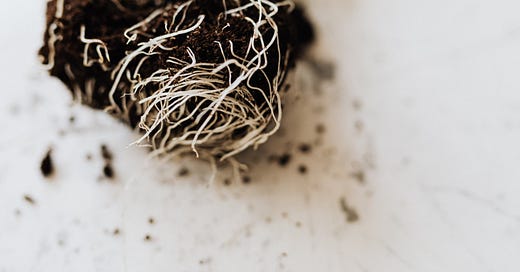Andrea Lani’s “Faith in a Seed” appears in Rooted 2: the Best New Arboreal Nonfiction.
I'm tempted to think of writing in terms of a growing tree—the germ of an idea, pollination, the planting of the seed, the slow accretion of words like cells, the sturdy trunk and leafy branches of paragraphs and sentences, the flowering and fruiting in the hands of readers. It's an imperfect metaphor, and yet one I return to again and again as I think about my essay in Rooted 2, in part because it took so long to grow, from idea to publication.
The seed was planted in 2012, on a visit to the arboretum near my office during a lunch break. I sat beneath an American chestnut tree and remembered the day, eleven years earlier, when my son was a tiny baby and my husband orchestrated the planting of the trees. I sketched the ribbed leaves and spiny burrs in my journal and marveled that the trees were already setting seed for another generation. Two years later I returned to the chestnut grove to find that many of the trees had succumbed to chestnut blight.
These three encounters with the chestnut grove—witnessing the trees being planted when my son was an infant, revisiting them when he was eleven and discovering they were reproducing, returning again when he was thirteen and seeing that the trees were dying—felt significant, and over the next year the idea of a convergence between the trees' experience and my son's knocked around in my brain, eventually germinating into a seedling of an essay, 1,200 words long.
I sent this short piece to my writing group in the fall of 2015, with a note that said, "I was intending for it to be a story about parenting a teenager, but it ended up being about trees." My writing group recommended expansion, and I dug into research on the history of the American chestnut, the chestnut blight, and the efforts to bring the species back from extinction through back-crossing with Chinese chestnut trees. A month later I sent them a new version, 4,200 words long. My seedling had grown into a tree!
My writing group responded with enthusiasm, and I spent the next six months revising the essay (pruning, fertilizing, training) and then began the agony of the submission process, sending it out to fourteen publications over the next four years (winter storms, pests, disease) before it found a home in the January 2020 issue of Spire: The Maine Journal of Conservation and Sustainability. At last my tree bore fruit!
And it's continued to be fruitful, becoming part of the diverse collection of trees that make up Rooted 2. I can't imagine better company for my essay/tree than the apples, spruces, catalpas, pines, oaks, maples, pawpaws, and beeches that share the pages of this literary forest.
Andrea Lani is the author of Uphill Both Ways: Hiking toward Happiness on the Colorado Trail (Bison Books, 2022). She writes about family and the natural world from her home in Maine, and her work has been published in Orion, The Maine Review, Deep Wild, and other journals. She's a graduate of College of the Atlantic and the University of Southern Maine's Stonecoast MFA program, and she's a Maine Master Naturalist and a senior editor at Literary Mama. She can be found online at www.andrealani.com.



